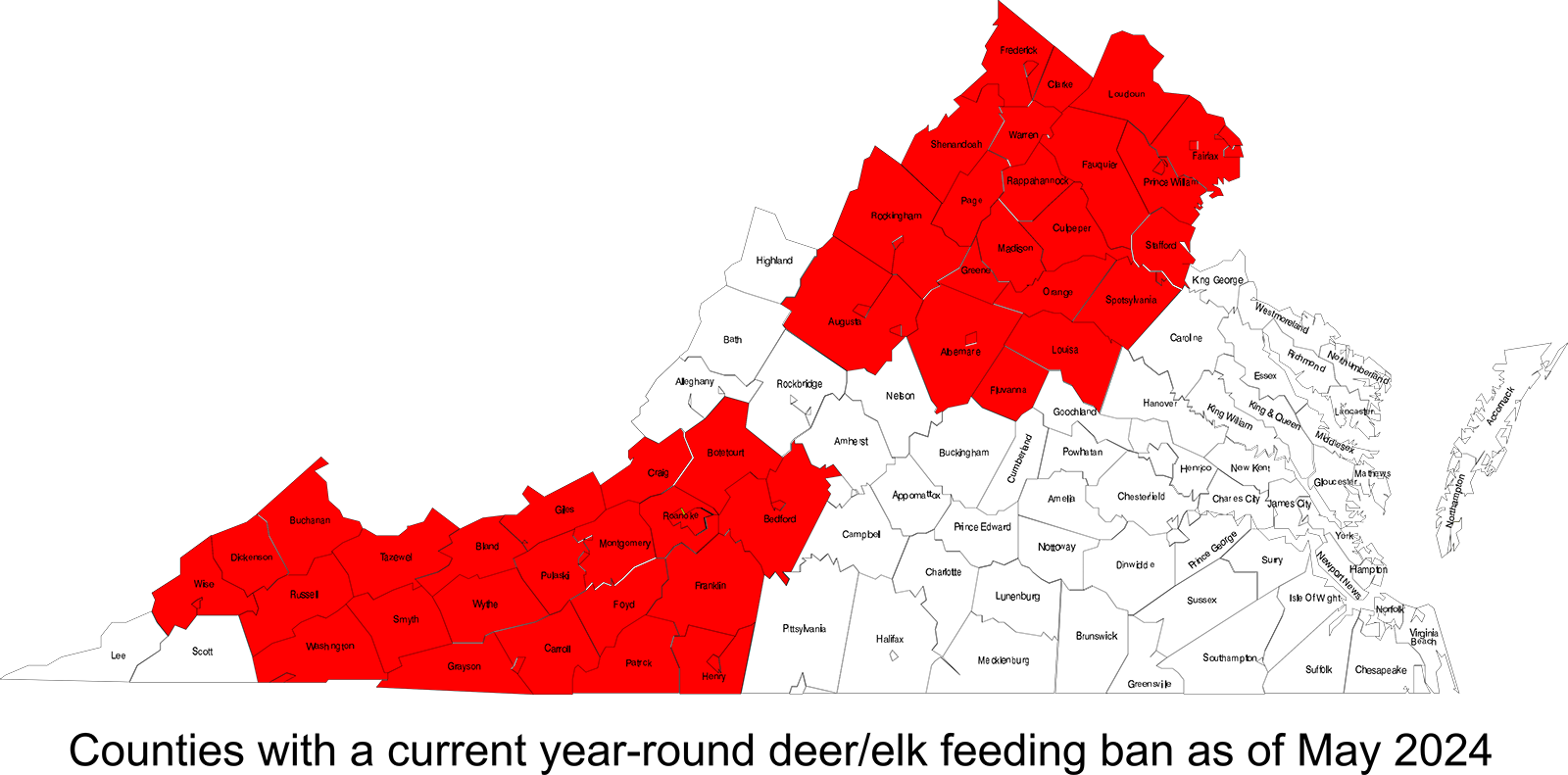Please don’t feed the deer! Hunting over bait is illegal in Virginia, and feeding deer for any reason is illegal statewide from September 1 to the first Saturday in January (4VAC15-40-285). Feed or bait can include corn, mineral or salt licks, pelleted feed, bird seed, apples or other fruit, and similar substances placed by people for the purposes of feeding or attracting wildlife. If deer are eating from your bird feeder, you’re feeding deer!
Further, it is illegal to feed deer year-round in the following counties (including the cities and towns within): Albemarle, Arlington, Augusta, Bedford, Bland, Botetourt, Buchanan, Carroll, Clarke, Craig, Culpeper, Dickenson, Fairfax, Fauquier, Floyd, Fluvanna, Franklin, Frederick, Giles, Grayson, Greene, Henry, Loudoun, Louisa, Madison, Montgomery, Orange, Page, Patrick, Prince William, Pulaski, Rappahannock, Roanoke, Rockingham, Russell, Shenandoah, Spotsylvania, Stafford, Tazewell, Warren, Washington, Wise, and Wythe and in any city, town, or county during any deer or elk hunting season. This does not apply to wildlife plantings like food plots, normal agricultural operations (e.g., crop plantings or feeding livestock), or wildlife management activities conducted or authorized by the Department.

Feeding deer outside the deer-hunting season is a popular activity among some sportsmen/women and wildlife watchers. Most feeding is done by well-intentioned people who think that providing food for deer will help them survive better or produce better quality antlers. While feeding may provide enjoyment to people, wildlife biologists do not recommend this activity for several reasons.
- Feeding wildlife, especially deer, can cause them to lose their fear of humans, a situation that can be dangerous to both people and animals. More people are attacked and injured by habituated (tame) deer each year than bears in the U.S., and multiple altercations with habituated deer have been reported in Virginia in recent years, with deer going after both humans and pets. A cute backyard photo opportunity is not worth your (or your neighbor’s) kid or pet getting stomped.
- Feeding can concentrates deer around human civilization and infrastructure, leading to increased human-deer conflict like residential plant damage and deer-vehicle collisions. Many urban conflicts with deer can be attributed to someone else feeding deer in the area.
- When many deer are using a feeding area, the possibility of spreading and maintaining disease among animals is increased. Attracting deer to feeding sites has been linked to the spread of tuberculosis and chronic wasting disease in some states.
- Feeding can harm or kill deer. In winter, a deer is well adapted to survive by eating the foods provided by Mother Nature which are typically of poor nutritional quality, and utilize the fat stores accumulated in late summer and early fall. A rapid change in a deer’s diet can leave the animal unable to digest the new food and can have a deadly outcome from rumen acidosis or bloat. Also, corn and other feeds are sometimes contaminated with aflatoxin, a toxic substance that is produced by certain molds and can poison deer and other wildlife. Often, corn marketed as “Deer Corn” contains levels of aflatoxin that are above those acceptable for use by livestock or humans.
- Feeding deer can increase their survival and reproductive output, causing local deer populations to increase beyond what the local habitat can support. Too many deer can cause habitat damage, harming the long-term survival of both deer and other wildlife in the area that depend upon that habitat.
Help keep the “wild” in wildlife — Don’t Feed the Deer!

